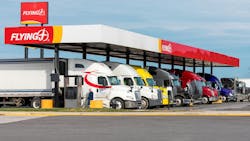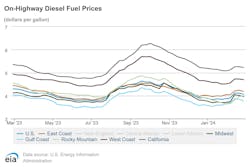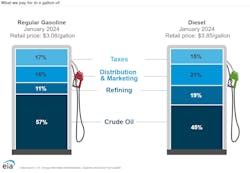Diesel and gasoline prices slip as spring nears
Average diesel fuel pump prices dropped a nickel nationally over the past week, according to government tracker U.S. Energy Information Administration. For the week of Feb. 26, diesel prices averaged $4.058 per gallon, according to the EIA, which is 5 cents lower than last week and 23 cents less than the national average this time last year.
All but one U.S. region saw its average diesel pump prices fall over the past week, according to EIA. Rocky Mountain states, however, saw diesel prices increase 4 cents to $3.999 per gallon. Elsewhere, the Gulf Coast’s trucking fuel costs decreased the most at 7 cents, lowering the region’s diesel prices to $3.768 per gallon. The Lower Atlantic sub-region also saw a more significant price decrease of 6 cents to $4.120 per gallon, and the East Coast saw a drop of 5 cents to $4.185.
With these price alterations, the Gulf Coast remains the cheapest place for diesel fuel, while California is the most expensive at $3.768 per gallon.
According to the EIA, the bulk of diesel fuel’s cost is still going toward crude oil production, with 45% of January 2024’s $3.85 per gallon, or $1.73, funneled to the task. Distribution and marketing took up the second-largest contribution of fuel prices at 21%, or about 80 cents, with refining costs taking third place at 19% (73 cents) of the diesel price average. Finally, Uncle Sam’s taxes comprised the least of diesel fuel's costs at 15% or 57 cents.
In comparison, the AAA motor club logged its current diesel average at $4.071 per gallon, cheaper than the EIA by two cents. AAA reported $4.099 per gallon a week ago and $4.427 from a year ago.
Gasoline prices decline, save for West Coast
Similar to diesel fuel, gasoline prices primarily decreased. The EIA’s national gasoline average is $3.249, two cents cheaper than a week ago and 9 cents lower than last year. This effect was mirrored across the country, save for the Rocky Mountain region and the West Coast, both with and without California.
See also: Diesel prices a mixed bag, gasoline continues to rise
Gas prices in the Rocky Mountain region climbed 6 cents to $2.982 per gallon while the West Coast with California increased 2 cents to $4.082 and without the state increased 8 cents to $3.690. California saw a 2-cent decrease in gas prices to $4.440 per gallon.
As for the rest of the country, most regions saw small price decreases, with the largest of 5 cents bringing the Gulf Coast’s gas prices down to $2.845 per gallon. This made the region the cheapest place for gas as well as diesel, while California remains the most expensive.
This week’s AAA gas average is $3.264, one cent less than last week. Last year’s average is $3.368, making this year’s price 10 cents better.
As to why prices faltered when they seemed on the way up, the AAA estimated in a press release that the eventual reopening of the BP-Whiting refinery in Indiana could have relaxed prices. The facility first closed in early February due to power issues. However, this doesn’t erase the impact warmer spring temperatures will likely have on fuel prices.
“Old man winter is shuffling toward the exit, and with milder weather and longer days looming, the seasonal rise in gas prices is primed to begin,” said Andrew Gross, AAA spokesperson. “But it will probably be a slow, wobbly start to rising prices.”
About the Author
Alex Keenan
Alex Keenan has been associate editor for Endeavor's Commercial Vehicle Group, which includes FleetOwner magazine, since 2022. She has written on a variety of topics for the past several years and recently joined the transportation industry, reviewing content covering technician challenges and breaking industry news. She holds a bachelor's degree in English from Colorado State University in Fort Collins, Colorado.


